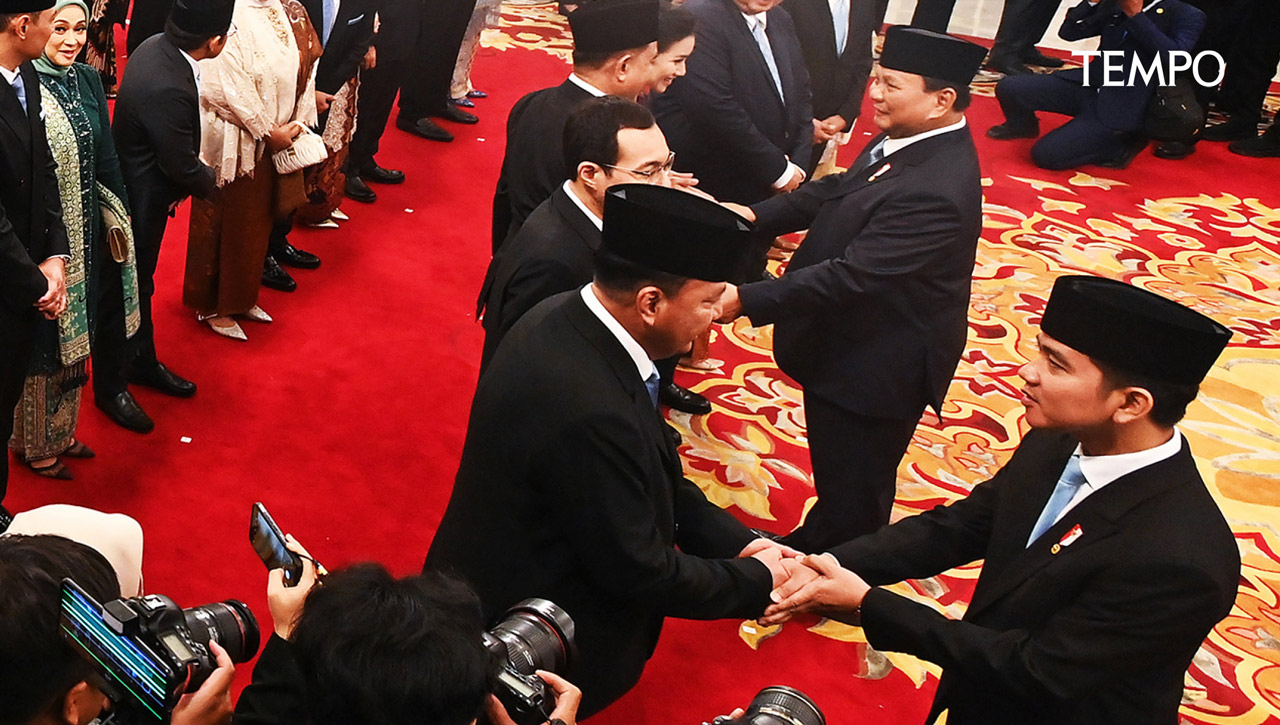Prabowo’s Oversized Cabinet
A number of problematic individuals are appointed to Prabowo Subianto’s cabinet. It will be difficult for the government to be effective in its first one or two years.
Tempo
October 28, 2024

THE inclusion of problematic individuals in the Red and White Cabinet, as well as the disarray caused by changes to the cabinet structure and to institutions as a result of the splitting of ministries, raises a question: what can we hope for from the new government in its first 100 days, or even in its first year?
After calling for unity in his first speech as president, Prabowo Subianto included as many people as possible and even accommodated the interests of oligarchs as a way of returning favors. As well as appointing 48 ministers, he appointed 56 deputy ministers and established five new ministerial level agencies. He also established new positions such as special envoys and special advisors. Prabowo has interpreted unity as sharing out power.
A number of officials, for example, have worked with or have business relationships with Andi Syamsuddin Arsyad, alias Haji Isam, a businessman who owns the Jhonlin Group, who some believe provided logistical support to help Prabowo win the presidency. Their closeness to the coal mining and oil palm tycoon could trigger conflicts of interest and could easily give rise to abuses of authority.
One of these people is Environment Minister Hanif Faisol Nurofiq, who has been close to Haji Isam since he was Head of the Forestry Office in Tanah Bumbu, South Kalimantan. There are also ministers who have worked in companies owned by Isam, such as Transportation Minister Dudy Purwagandhi and Public Works Minister Raden Dody Hanggodo. Deputy Forestry Minister Sulaiman Umar Siddiq is even closer, he is Isam’s brother-in-law.
Prabowo has also included people who have had legal problems in the past. Deputy Justice Minister Edward Omar Sharif Hiariej, for example, was named a suspect by the Corruption Eradication Commission. Youth and Sports Minister Ario Bimo Nandito Ariotedjo was caught up in the corruption relating to the 4G transmitter tower project at the Communication and Informatics Ministry. Meanwhile, Coordinating Minister for the Economy Airlangga Hartarto was questioned by the Attorney General’s Office in relation to alleged corruption over crude palm oil export permits. These cases made them ‘hostages’, obliging them to go along with the wishes of Joko Widodo, the president before Prabowo.
Under the slogan of continuity, Prabowo copied Jokowi’s strategy, and also other presidents before him. Prabowo gave jobs to those who worked hard to see him to the presidency for the 2024-2029 term. He offered positions to non-coalition parties, and does not want any opposition.
In Europe, the idea of power sharing arose in order to bring about stability in the government. Cooperation between elites and various social groups, known as consociationalism, is an endeavor to embrace all interests, and encourages moderation among people who were previously polarized because of differences in ethnic background or religion, and includes protection of the interests of minorities. To ensure there is some control of the government, there is a place for a strong opposition.
In Indonesia, however, this approach has changed into political horse-trading. Members of the elite control the institutions of democracy. They produce policies that side with the interests of the elite, not the well-being of the people. Power is shared out in a large coalition, but no room is given for opposition—a requirement for democracy. Without opposition, democracy will turn into autocracy.
As well as sacrificing democracy, this sharing out of the pie has led to disarray in the structure of institutions. For example, the establishment of the Haj and Umrah Organizing Agency is a violation of the Haj Law and resulted in overlapping authority with the Ministry of Religious Affairs.
With this oversized cabinet, the early days of the new government will be spent on sorting out technical matters. These range from looking for offices and officials’ housing to the division of personnel. The budgets for these new ministries are still part of those of the old ministries. It will take one or two years to restructure the bureaucracy.
Because of this, ministers will not be able to work optimally, and perhaps will simply pretend to work. It will be difficult to accomplish the Prabowo government’s 100-day program. Prabowo can, of course, reshuffle his cabinet anytime he likes. But for reasons of accommodation politics, it is not impossible that he will once again fill his cabinet with problematic individuals.
To avoid disappointment, it is best not to hope for too much from Prabowo. As in the past, we should always be prepared for disappointment.
